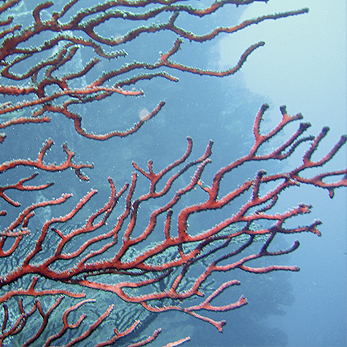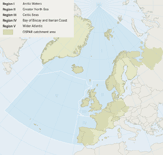The sustainable use of ecosystem goods and services through the application of the ecosystem approach is a core aspiration that is reflected in OSPAR’s vision of a clean, healthy and biologically diverse North-East Atlantic ecosystem and expressed in the EU Marine Strategy Framework Directive as ... maintaining biodiversity and providing diverse and dynamic oceans and seas which are clean, healthy and productive. Delivering the objectives of the OSPAR Strategies will contribute to achieving this aspiration.
The ecosystem approach requires the comprehensive integrated management of human activities based on the best available scientific knowledge about ecosystems and their dynamics, in order to identify and take action on influences which are critical to the health of marine ecosystems. This presents a challenge to existing methods for the assessment of the marine environment by requiring consideration of the wider implications of human activities on the quality, structure and functioning of marine ecosystems. Yet, understanding of the functioning of marine ecosystems and their interactions with human activities, and the availability of data supporting an ecosystem assessment are – and are likely to remain – limited. Assessment methodologies that support the ecosystem approach must accommodate these limitations and evolve with developments in knowledge.
A key starting point for developing methodologies to assess ecosystem health is an assessment of the overall status of biodiversity of the OSPAR area. Species and habitats that occur in the marine environment interact in complex and dynamic spatial and temporal patterns. Assessment methodologies need to link knowledge of the biology, chemistry and physics of the ecosystem. The basic challenge comprises three main steps: (1) to assess the status of species and habitats; (2) to assess the pressures from human activities; (3) to link the status and the impacts from pressures and take into account cumulative effects arising from multiple pressures and the interactions among species and habitats in the ecosystem. Knowledge from OSPAR’s established assessment work Chapters 4–10 needs to be brought into the context of what is known about the North-East Atlantic’s biodiversity. This is important for those parts of the ecosystem that are subject to multiple pressures, especially those that play a key role in ecosystem functioning.
During the reporting period covered by the QSR 2010, OSPAR has made important steps toward supporting the ecosystem approach through the concept of Ecological Quality Objectives (EcoQOs) which provide a link between human activities and impacts on biodiversity and collectively provide a means of expressing a clean, healthy and biologically diverse sea. OSPAR has also progressed the development of approaches to assess the cumulative impact of pressures on specific species groups and habitat types as well as to rank the various pressures specific to each OSPAR Region. OSPAR has noted complementary approaches to ecosystem assessment, such as those developed by the ICES (International Council for the Exploration of the Sea) Study Group for the Regional Integrated Assessment of the North Sea. These approaches are clearly part of an evolving field of work, which needs to incorporate new knowledge as it becomes available. This chapter outlines some of these OSPAR developments and illustrates their contribution to ecosystem assessments.
Continue to "Methods established to evaluate progress towards some OSPAR objectives"


